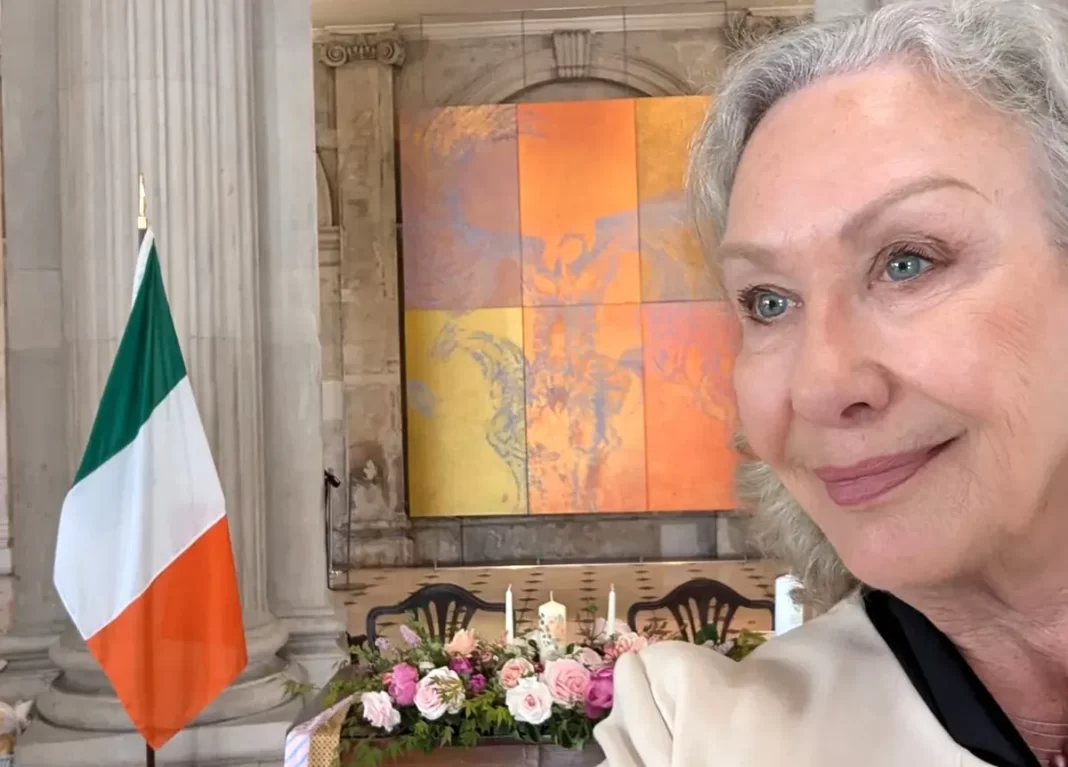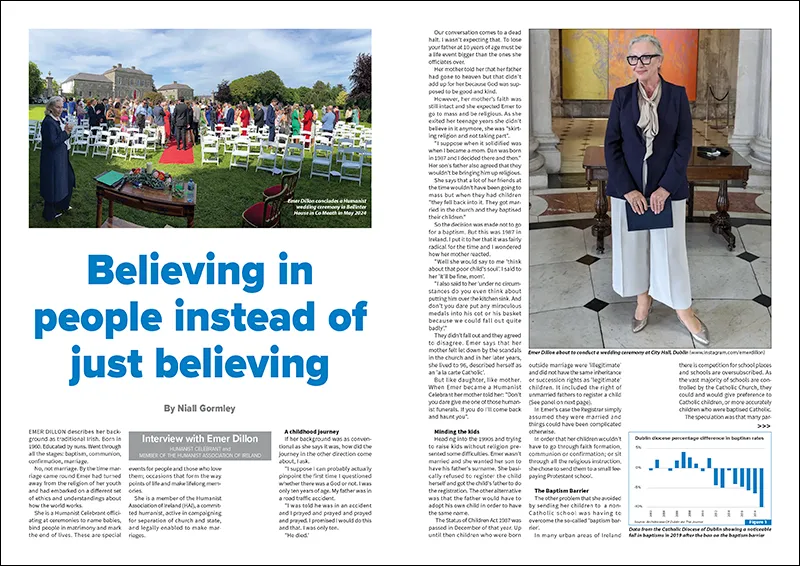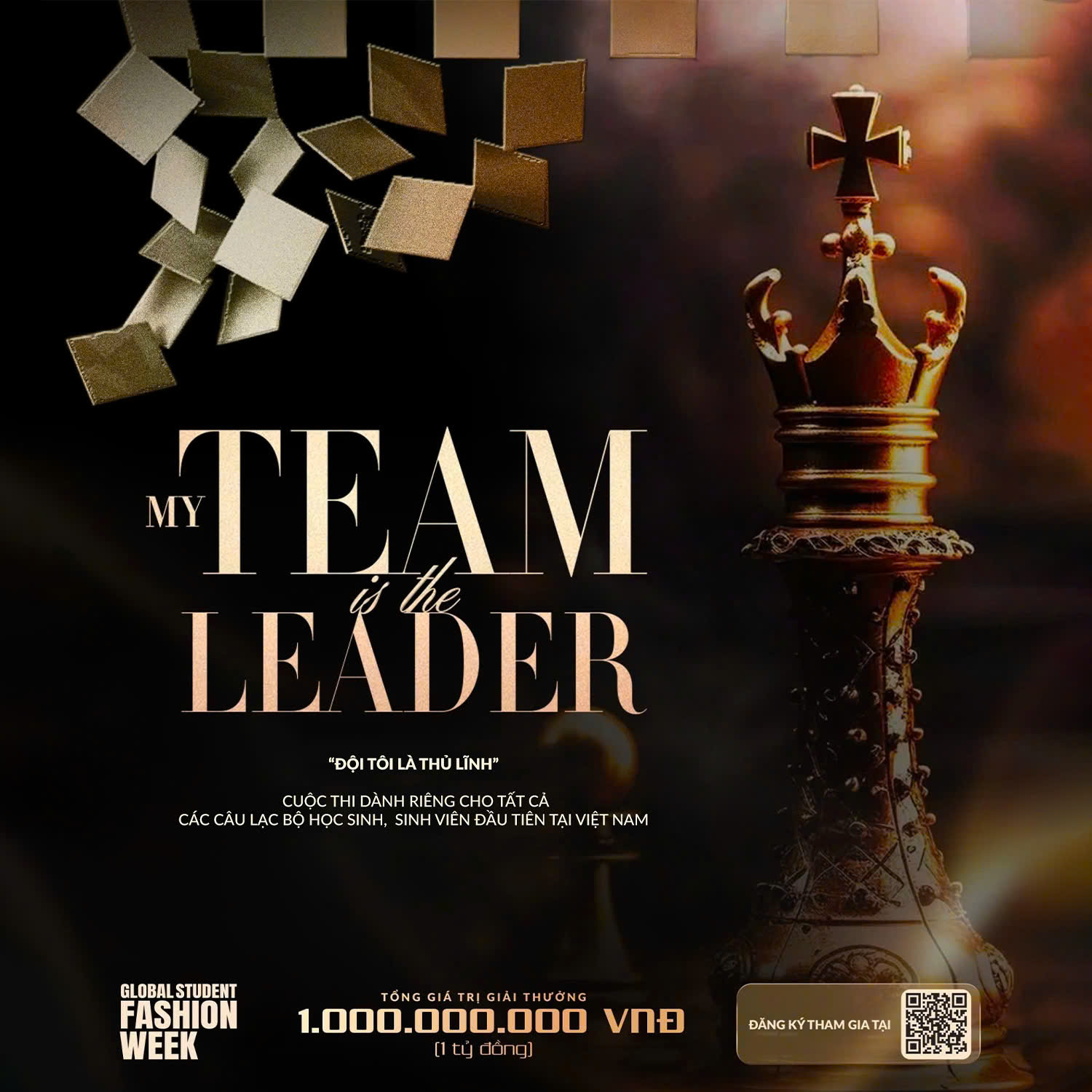Emer Dillon describes her background as traditional Irish. Born in 1960. Educated by nuns. Went through all the stages: baptism, communion, confirmation, marriage.
No, not marriage. By the time marriage came round Emer had turned away from the religion of her youth and had embarked on a different set of ethics and understandings about how the world works.
She is a Humanist Celebrant officiating at ceremonies to name babies, bind people in matrimony and mark the end of lives. These are special events for people and those who love them; occasions that form the way points of life and make lifelong memories.
She is a member of the Humanist Association of Ireland (HAI), a committed humanist, active in campaigning for separation of church and state, and legally enabled to make marriages.
A childhood journey
If her background was as conventional as she says it was, how did the journey in the other direction come about, I ask.
“I suppose I can probably actually pinpoint the first time I questioned whether there was a God or not. I was only ten years of age. My father was in a road traffic accident.
“I was told he was in an accident and I prayed and prayed and prayed and prayed. I promised I would do this and that. I was only ten.
“He died.’
Our conversation comes to a dead halt. I wasn’t expecting that. To lose your father at 10 years of age must be a life event bigger than the ones she officiates over.
Her mother told her that her father had gone to heaven but that didn’t add up for her because God was supposed to be good and kind.
However, her mother’s faith was still intact and she expected Emer to go to mass and be religious. As she exited her teenage years she didn’t believe in it anymore, she was “skirting religion and not taking part”.
“I suppose when it solidified was when I became a mom. Dan was born in 1987 and I decided there and then.” Her son’s father also agreed that they wouldn’t be bringing him up religious.
She says that a lot of her friends at the time wouldn’t have been going to mass but when they had children “they fell back into it. They got married in the church and they baptised their children.”
So the decision was made not to go for a baptism. But this was 1987 in Ireland. I put it to her that it was fairly radical for the time and I wondered how her mother reacted.
“Well she would say to me ‘think about that poor child’s soul’. I said to her ‘It’ll be fine, mom’.
“I also said to her ‘under no circumstances do you even think about putting him over the kitchen sink. And don’t you dare put any miraculous medals into his cot or his basket because we could fall out quite badly’.”
They didn’t fall out and they agreed to disagree. Emer says that her mother felt let down by the scandals in the church and in her later years, she lived to 96, described herself as an ‘a la carte Catholic’.
But like daughter, like mother. When Emer became a Humanist Celebrant her mother told her: “Don’t you dare give me one of those humanist funerals. If you do I’ll come back and haunt you”.
Minding the kids
Heading into the 1990s and trying to raise kids without religion presented some difficulties. Emer wasn’t married and she wanted her son to have his father’s surname. She basically refused to register the child herself and got the child’s father to do the registration. The other alternative was that the father would have to adopt his own child in order to have the same name.
The Status of Children Act 1987 was passed in December of that year. Up until then children who were born outside marriage were ‘illegitimate’ and did not have the same inheritance or succession rights as ‘legitimate’ children. It included the right of unmarried fathers to register a child (See panel on next page).
In Emer’s case the Registrar simply assumed they were married and things could have been complicated otherwise.
In order that her children wouldn’t have to go through faith formation, communion or confirmation; or sit through all the religious instruction, she chose to send them to a small fee-paying Protestant school.
The Baptism Barrier
The other problem that she avoided by sending her children to a non-Catholic school was having to overcome the so-called ‘baptism barrier’.
In many urban areas of Ireland there is competition for school places and schools are oversubscribed. As the vast majority of schools are controlled by the Catholic Church, they could and would give preference to Catholic children, or more accurately children who were baptised Catholic.
The speculation was that many parents were opting to get children baptised just in case they needed to qualify for their local Catholic school or a Catholic school of their choice.
In 2018 then Education Minister Richard Bruton introduced legislation to outlaw the ‘Baptism Barrier’ whereby religious schools were able to choose children of the faith of the school.
The Education (Admission To Schools) Act 2018 came into force despite the opposition of the church. The Journal news site reported that in the year following the ban on the baptism barrier the number of baptisms in the Dublin archdiocese fell by 10 per cent. (See Figure 1).
Finding humanism
Although she had gone well out of her way to avoid religion, Emer had not run into many people like herself either. The thought of herself as a bit of an outlier.
Then a good friend’s mother died suddenly and with the shock she was at a bit of a loss about what to do because the lady in question wasn’t religious. But they discovered that the women had, in fact, left clear instructions that her funeral was not to be held in a church.
Emer remembered she had seen a guy on RTE1 TV that week talking about humanist funerals and that he was now a celebrant.
The guy was Brian Whiteside, a long-term advocate for humanism and campaigner for secular marriages. He conducted the funeral, and it was only his second ever.
Humanist marriage is another case of religious versus secular legitimacy. The Civil Registration Act 2004 recognised religious bodies only as marriage solemnisers. If people wanted a secular wedding, they also had to get a civil registrar to make it legal.
Emer refers to these as “symbolic” ceremonies because they didn’t have legal force behind them.
After much campaigning by the HAI the Civil Registration Act 2012 was introduced which added non-religious organisations to the list of registered solemnisers.
The first Humanist wedding happened on the 6th of April 2013 and since then there have been around 14,000. Humanist weddings are becoming more popular with more than 2,000 per year taking place in 2022.
The change taking place in the type of wedding ceremony chosen by couples is breathtaking. Catholic ceremonies from 62 per cent in 2013 ago to just 35 per cent in 2023. Some of this reduction is due to the increase in other religious options such as spiritualist and ‘new age’ ceremonies. A larger proportion is due to the increase in non-religious weddings from the Humanists and civil registrations from the state. Figure 2 shows the narrowing gap.
Finding her tribe
For Emer finding out about humanism was like a revelation. She immediately signed up for a family membership.
“And my teenage children were absolutely horrified because as far as they were concerned, they’d been able to live their lives free from any cultism. And now I was signing them up to a cult!,” she laughs.
She had already decided to become a humanist celebrant and her training was fast-tracked because another HAI celebrant was terminally ill and had many advanced bookings. She says she was “thrown in at the deep end”.
I ask her about her approach to secular weddings, especially as for many people this is new territory as most people, especially older people, would be more comfortable with religious ceremonies.
“First of all, the couple would have made the decision. I’m quite clear. I’m kind of quite down-the-line. Absolutely no religious content whatsoever.
“So even if Auntie Mary wants to come up and read a reading that has a prayer that was read at her own wedding or something like that, you know, I might need to edit that. There’s plenty of other readings that Auntie Mary could read.”
But, I say, that sounds a bit, kinda, sorta…….
….militant?
She’s not shocked at the allegation. “I am a bit,” she says with a smile. There are other Humanist celebrants who are more flexible.
“I just think it’s a mixed message, you know. The Humanist Association of Ireland celebrants are the only secular ones. So there’s lots of others.
“First of all, there’s the civil servants, which are the celebrants in the HSE when you go to the registry office. They will now come to some venues as well and conduct the legal elements to your ceremony.”
Her point about the HSE Registrars is that they are not celebrants and these are thus not secular weddings. There are other celebrants as well such as the Spiritualist Union of Ireland or inter-faith celebrants.
Not like for like
Naming ceremonies are not direct replacements for baptisms. Firstly, there is no legal side to baptism, it’s simply registering with the religious body involved. The civil registration of birth takes place in the hospital or wherever the birth happens and that is where children are legally recognised by the state.
A naming ceremony is a replication of baptism which, in turn, evolved from many birth traditions throughout human history. Because of the traditional beliefs around original sin, many Catholics got babies baptised as soon as possible.
Humanists are not keen on the idea of original sin and so there’s no hurry. I ask Emer what the typical time frame is.
“In around about a year or so, usually around the first birthday. Sometimes it can be earlier, depending on the season. There’s legal restrictions on where you can conduct a wedding whereas there’s nothing on naming ceremonies.”
Final destination
Weddings and naming ceremonies are happy occasions. The other main business of a celebrant is marking death.
“I became a celebrant in order to conduct funerals much more so than weddings. But of course, weddings have taken over most of the work I do,” she says.
The reason for this is that weddings are planned and funerals can’t be. So Emer may have weddings booked a year in advance but funerals really must be planned within a day in most cases.
While people can’t accurately predict the day they will need a celebrant, there are many plans that they can make.
“You have to say what your intentions are, you have to. That’s one of the greatest gifts you can give your family,” she says.
“I will guide people through the process. I would always meet with the family. I’ll drop things, I’ll get into my car, I’ll drive over to the other side of the city, or down to Kildare or whatever it might be.”
What about tragic cases? How does she handle those?
“We do complete a certain amount of training over the years to prepare us for hard cases. So if somebody has died by suicide, that’s a tough one. And I haven’t done any baby funerals but there’s a few Humanist Celebrants that have.”
Emer recalls a case where she got a call from a woman whose husband was at the end of his life. He had attended two funerals that Emer had conducted and he said to his wife ‘get that woman!’.
“So I said, would he like to have a chat? And she said ‘oh, he would love that’. So I took myself into the hospital where he was, three weeks prior to him passing away.”
She read the draft to him and he was really happy. “So we actually had time to work back and forth on the draft of the ceremony. What he wanted said. What he didn’t want said.” Emer has also conducted some funerals for people that she knew, which she found to be personally difficult.
On the agenda
Finally, I ask her to put her Humanist Association hat on. What does she see as the secularist agenda over the next few years?
She points to the education system where the Catholic Church still has a huge amount of control. (See Figure 3). There has been very little change and she seems to accept that there won’t be any wholesale handover of schools. Her approach would be to move the faith formation and sacrament preparation out of schools.
In the meantime, life outside religion is becoming more accessible and acceptable by the year and Emer Dillon intends to keep playing her part in that.




